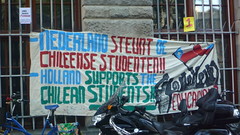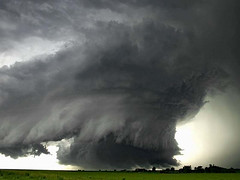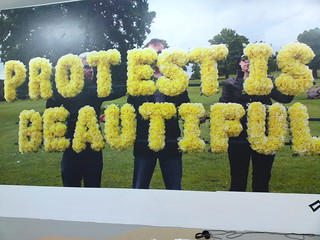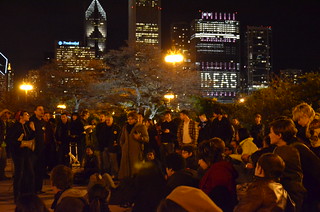 My guest on this edition of Citizenreporter.org is Chilean-American, community organizer, world citizen Nick Farr who has been traveling around Chile observing many of the activities connected with the student protests demanding education reform in that country.
My guest on this edition of Citizenreporter.org is Chilean-American, community organizer, world citizen Nick Farr who has been traveling around Chile observing many of the activities connected with the student protests demanding education reform in that country.
For several months students throughout Chile have been holding mass rallies, protests as well as occupying university and high school buildings, demanding the government take action to address inequality in the education system and the creation of the country’s first free higher education option.
Presently education in Chile consists of a few prestigious charter-type schools, many more prestigious private schools which are very expensive, and then the rest of the public system that is considered poor quality-undesirable schooling. Rural areas, which is most of Chile, are especially plagued by a lack of affordable education. But even in cities these days, access to good schools is entirely dependent on where you live.
The student movement that has exploded throughout the country is focused on the need for better quality and more accessible public education at all levels, especially secondary and university education. While occupy wall street started just over a month ago, students in Chile began occupying school buildings 4 months ago. As part of the occupation, they carry out a fully functioning program of providing meals, classes and cultural activities.
One of the arguments against the students stems from the main leader of the movement who is a very vocal communist. Political opponents and many critical Chileans view his role as “evidence” that this protest is a communist invasion of the country.
Meanwhile the nation, that is highly dependent on the price of copper, struggles as global commodity prices have become so unstable. Graduates who come out of the current higher education system find themselves with little choice when it comes to jobs and career. Despite whatever specialized skills and training they might have had, the only work available to them might be in the low paying service industry.
With the protests as the backdrop, negotiations take place and one point the government hopes students will compromise on is the goal of a “free” education. A point that student leaders refuse to compromise on.
After several decades of tremendous socio-economic progress which saw Chile become a much admired country in the region and around the world, there is talk now of a shrinking middle class and a return to the former paralyzing state of cronyism and inequality.
Will Chilean students achieve their goal? Will the unpopular Chilean government give in to a mass movement sweeping the nation and conducting mass action in the streets and in the schools? In a time where so many nations have bought into the idea of corporate schools or charter schools, could Chile be the place where an old idea is given new life – universal public education.
Link:
Educación 2020 – One of the Movement’s Web Sources
El Mercurio – News from Chile

 In my formidable years as a university student and an activist, I happily attended any and all protests I could. To this day you might catch me bragging about the effects of tear gas and the importance of having a gas mask. I tried, using what means were available to me, to carry on the tradition I learned about in history books and through personal stories from previous generations- those who had protested before me. There is a great sense of pride and belonging that comes with engaging in such activities despite the occasional risks and tremendous odds one often faces. (Pro-East Timor Independence protests in the late 90’s were interesting but, admittedly, small)
In my formidable years as a university student and an activist, I happily attended any and all protests I could. To this day you might catch me bragging about the effects of tear gas and the importance of having a gas mask. I tried, using what means were available to me, to carry on the tradition I learned about in history books and through personal stories from previous generations- those who had protested before me. There is a great sense of pride and belonging that comes with engaging in such activities despite the occasional risks and tremendous odds one often faces. (Pro-East Timor Independence protests in the late 90’s were interesting but, admittedly, small)
 Contrary to what the media tells us, Black Friday is not about shopping.
Contrary to what the media tells us, Black Friday is not about shopping.  My guest on this edition of Citizenreporter.org is Chilean-American, community organizer, world citizen
My guest on this edition of Citizenreporter.org is Chilean-American, community organizer, world citizen